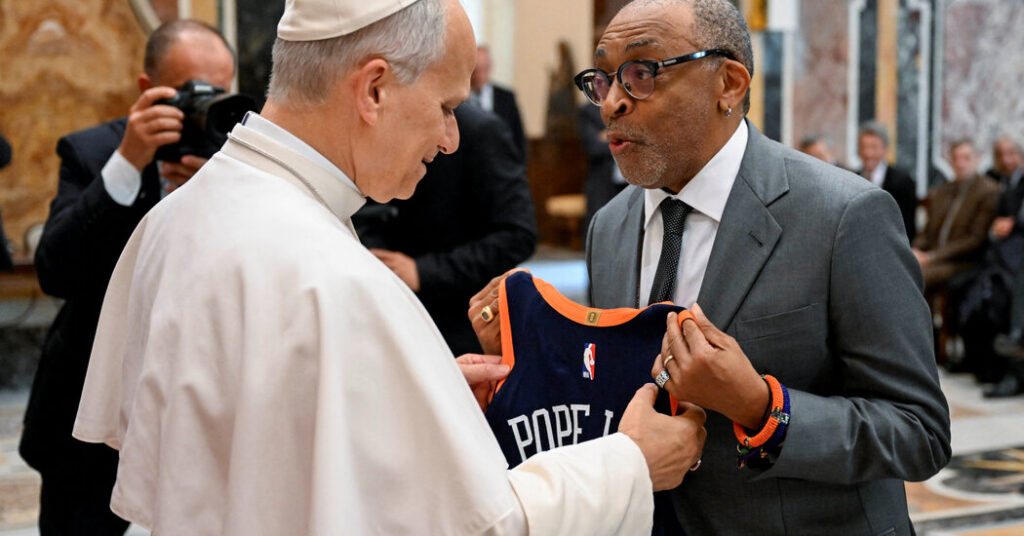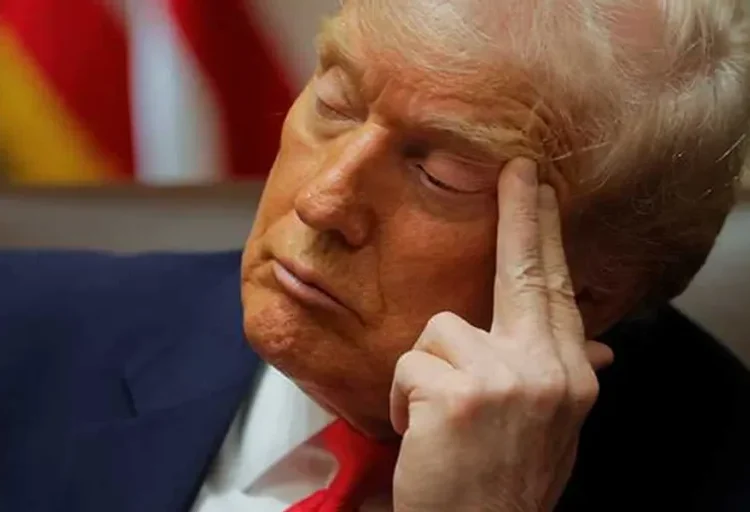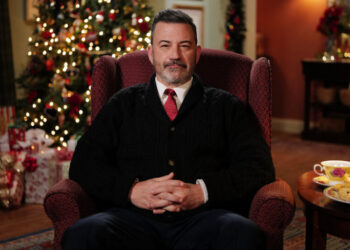Pope Leo XIV on Saturday called on a star-studded audience of filmmakers and actors to be “witnesses of hope, beauty and truth,” promoting human dignity and confronting issues like poverty, exile, addiction and forgotten wars.
“Good cinema does not exploit pain; it recognizes and explores it,” Leo said. “This is what all the great directors have done,” he told an audience of what the Vatican described as “the world of cinema” that included Judd Apatow, Cate Blanchett and Spike Lee, who presented the pope with a New York Knicks jersey.
The event was part of ongoing efforts by the Vatican to engage with the world of culture, including participation in the art and architecture Biennales in Venice and working with artists to develop projects in prisons.
But left unspoken at the public event were deep rifts over social issues like abortion and same-sex marriage, concerns Leo had raised before he became pope and that flare up often in contemporary culture wars.
Speaking to bishops at the Vatican in 2012, the former Father Robert Prevost lamented that Western mass media fostered “sympathy for beliefs and practices that are at odds with the gospel,” citing abortion, euthanasia and a homosexual lifestyle including “alternative families comprised of same-sex partners and their adopted children.”
Still, despite underlying differences on some social issues, the celebrities at the event seemed to appreciate Leo’s view that the cinema should show the world as it is, with its pain and its poetry.
Ms. Blanchett — who has starred in films featuring L.G.B.T.Q. protagonists like Carol and Tár and in 2023 launched a fund for women, trans and nonbinary filmmakers — said that the pope had challenged them to entertain while also including “voices that are often marginalized,” not shying away “from the pain and complexity that we’re all living through right now.”
In a nod to dropping box office revenues, Leo also said more should be done to protect cinemas, which were “experiencing a troubling decline,” a statement that elicited long applause.
Mr. Apatow, a director and producer who has campaigned for same-sex marriage and L.G.B.T.Q. issues, agreed. “It’s important that people get together and have common experiences, and the movie theater is one place that we do that in a big way, so we need everyone to spend more time at the movie theater, less time on the lazy boy.”
When Pope Pius XII addressed the world of cinema in 1955, he said banning corrupt movies could be “desirable,” combating them “with the legal and moral weapons at their disposal.” Those days are long gone, as is censorship, said the Rev. Davide Milani, who was part of the commission that organized Saturday’s audience. Instead, through local bishops conferences, the church tries to evaluate films by the message they present.
Under Pope Francis, the Vatican’s culture office initiated a series of meetings that brought artists to the Vatican in 2023 and comedians in 2024. Saturday’s encounter with filmmakers was planned in that vein.
“Part of our official mission is to maintain good relations between the church and the world of culture,” said the Rev. Paul Tighe, the secretary of the Vatican’s culture and education office. These events are “an invitation to the world of culture to be close to the Vatican, and giving them an audience is to recognize their contribution and celebrating them,” he said.
On Saturday, Leo praised cinema’s “capacity to amaze and even continue to offer us a glimpse, however small, of the mystery of God,” and its ability “to contemplate and understand life, to recount its greatness and fragility and to portray the longing for infinity.”
The filmmakers and actors came from around the globe, with the majority from Italy, including the horror film director Dario Argento and the actress Alba Rohrwacher, best known for the series “My Brilliant Friend.”
Because of scheduling conflicts, those who came for Saturday’s audience were “selected by circumstance” said Bishop Tighe, adding that many who could not participate had sent “beautiful messages” that “were appreciative of the initiative.” Nonetheless, he said, “it’s a very good representative group of the world of cinema.”
Leo’s own tastes, he recently said, run to more mainstream classics like Frank Capra’s “It’s a Wonderful Life” from 1946 and Robert Wise’s 1965 classic “The Sound of Music,” in which the protagonist, played by Julie Andrews, ultimately ditches her life in a convent for love.
The actress Leslie Mann, who is married to Mr. Apatow, said she had been inspired by Leo’s words. “I said I would like to help spread hope. And he said we have to work together. And I said, I will do that,” she said.
Asked whether that might inspire his next film, Mr. Apatow laughed. “A hopeful Vatican comedy, you never know,” he said.
Josephine de La Bruyère contributed reporting.
Elisabetta Povoledo is a Times reporter based in Rome, covering Italy, the Vatican and the culture of the region. She has been a journalist for 35 years.
The post Pope Leo Urges Cinema Notables to Redouble Focus on Social Justice appeared first on New York Times.




